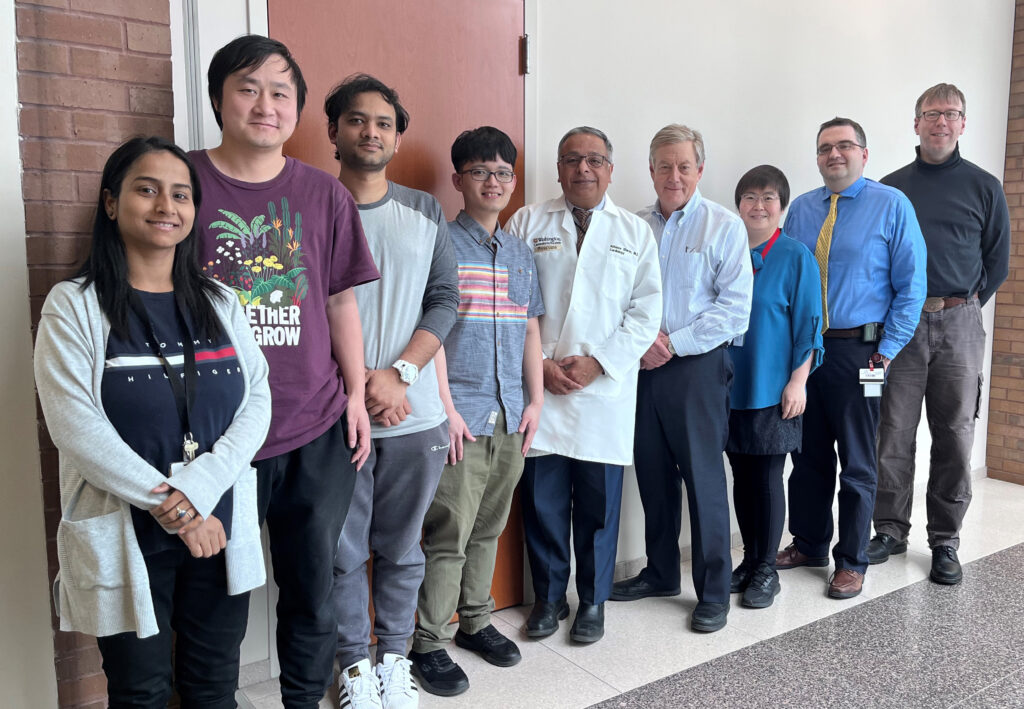The Diwan Lab, in the Center for Cardiovascular Research, is dedicated to the study of lysosomes, and seeks to understand how these cell parts can be targeted by therapies to treat and prevent cardiovascular diseases, diabetes, Alzheimer’s disease and more.
Lysosomes are organelles, parts within cells that serve several biological functions. The Diwan Lab has done extensive research on lysosome dysfunction and how it contributes to myocardial infarction, heart failure and cardio-metabolic diseases. The lab has identified acquired lysosome dysfunction as a shared mechanism between these conditions and other aging-induced pathologies such as Alzheimer’s disease and Type 2 diabetes, offering hope to develop treatments to target them simultaneously.
The lab is led by Dr. Abhinav Diwan, Professor of Medicine, Cell Biology and Physiology, and Obstetrics and Gynecology. Dr. Diwan is passionate about his work, and supporting his team. Current lab members include cardiovascular division faculty Dr. Xiucui Ma and Dr. David Rawnsley, senior scientist Dr. John Murphy, postdoctoral researcher Dr. Minu Kumari, PhD student Moydul Islam, and research assistant Chen Zhao. Dr. Diwan also co-mentors post-doctoral researchers, Dr. Adelita Mendoza with Dr. Kerry Kornfeld and Dr. Kenji Rowell Lim with Dr. Douglas Mann. The Diwan and Mann labs have recently merged to boost their collaborative efforts, spurring novel areas of discovery and offering further opportunities for trainees.
Studies published by the Diwan Lab have had far-reaching impacts. A CNN article published in 2018 highlighted findings that intermittent fasting can reduce insulin dependence in people with Type 2 diabetes. A study showing that mothers can pass on risk of heart problems to their children when they eat a high fat diet was also widely reported on. In 2019, the lab published results of a study that found a key way to protect against heart failure in people who had experienced heart attacks.
In recent years, Dr. Diwan has also focused on Covid-19 research. Through his work at the VA hospital, where he was recently promoted to Chief of Cardiology, Dr. Diwan has taken a leadership role in mitigating the devastating effects of the novel coronavirus in the veteran population and studying cardio-metabolic complications of Long Covid. The lab’s work led to a report that showed men, and particularly men with low testosterone levels, are at higher risk for severe Covid outcomes.
Dr. Xiucui Ma recently joined the cardiovascular division in February, and is enthusiastic about her opportunities in the Diwan Lab. She specializes in the study of autophagy in cell function, and how it contributes to heart failure. The possibilities of improving therapies for diseases based on discovering the way cells function in the body is what drives Dr. Ma’s work.
Postdoc researcher Dr. Miru Kumari has been in the Diwan Lab since April of 2020. She is inspired by being a part of the lab’s research team and says “uncovering the unexplored things” is one of her favorite things about her work. Dr. Kumari says that Dr. Diwan is a wonderful and supportive mentor who deeply values his team and helps them grow. She wants to pursue independent grants and research, and eventually have her own lab focusing on cardio-metabolic disease.
Moydul Islam is a 5th year PhD student in the Department of Chemistry, who joined the lab in spring 2019. He says that the Diwan Lab’s work speaks to him because it effects millions of people, and he is happy to be a part of that. Dr. Diwan’s mentorship has helped him gain valuable experience in his scientific education, and challenged him to present his work on platforms like national conferences. He sees opportunities to collaborate on his work with other labs and further the impact of his work.
While the Diwan Lab is doing extremely important work, the lab members agree that it is also a supportive and positive workplace. Each member of the lab have opportunities to contribute ideas and collaborate with each other, and Dr. Diwan cares about the people who work at the lab on a personal level, as well as valuing their scientific contributions. The Diwan Lab team have a lot to be proud of, and are an important part of the Washington University School of Medicine Cardiovascular Division.
